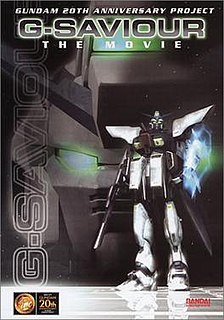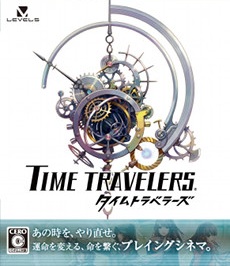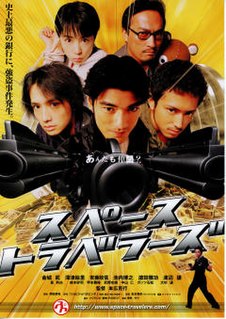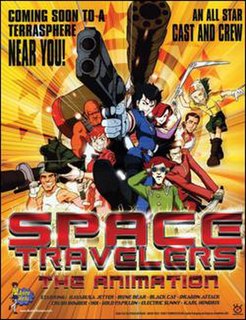See also
| This disambiguation page lists articles associated with the title Space traveler. If an internal link led you here, you may wish to change the link to point directly to the intended article. |
A space traveler is a person who performs human spaceflight.
Space traveler(s) may also refer to:
animated film
| This disambiguation page lists articles associated with the title Space traveler. If an internal link led you here, you may wish to change the link to point directly to the intended article. |

Gundam, also known as the Gundam series, is a Japanese military science fiction media franchise/media mix created by Yoshiyuki Tomino and Sunrise and, as of March 2020, indirectly fully owned by Bandai Namco Holdings through subsidiaries Sotsu and Sunrise. The franchise features giant robots (mecha) with the name "Gundam". The franchise began on April 7, 1979 with Mobile Suit Gundam, a TV series that defined the "real robot" mecha anime genre by featuring giant robots called mobile suits in a militaristic setting. The popularity of the series and its merchandise spawned a franchise that includes television series, OVAs, films, manga, novels and video games, as well as a whole industry of model robots known as Gunpla.

The history of anime can be traced back to the start of the 20th century, with the earliest verifiable films dating from 1906. Before the advent of film, Japan already had a rich tradition of entertainment with colourful painted figures moving across the projection screen in 写し絵 (Utushi-e), a particular Japanese type of magic lantern show popular in the 19th century. Possibly inspired by European phantasmagoria shows, utushi-e showmen used mechanical slides and developed lightweight wooden projectors (furo) that were handheld so that several performers could each control the motions of different projected figures.

G-Saviour is a 2000 Canadian live-action television film created as part of the Gundam franchise, produced by Polestar Entertainment and distributed by Bandai Visual.
Void may refer to:

Tokusatsu is a Japanese term for live action film or television drama that makes heavy use of special effects. Tokusatsu entertainment often deals with science fiction, fantasy or horror, but films and television shows in other genres can sometimes count as tokusatsu as well. The most popular types of tokusatsu include kaiju monster films such as the Godzilla and Gamera film series; superhero TV serials such as the Kamen Rider and Metal Hero series; and mecha dramas like Giant Robo and Super Robot Red Baron. Some tokusatsu television programs combine several of these subgenres, for example the Ultraman and Super Sentai series.
An interactive film, also known as movie game, is a video game that presents its gameplay in a cinematic, scripted manner, often through the use of full-motion video of either animated or live-action footage.

Cobra is a Japanese manga series written and illustrated by Buichi Terasawa. Set in the far future, the series tells the story of Cobra, who lives an adventurous life until his enemies begin to hunt him down. Cobra surgically alters his face and erases his own memory to hide from his foes and have a normal life. Eventually, he regains his memories and reunites with his former partner Lady Armaroid. Terasawa devised it as a mix of spaghetti western and samurai stories, and aspects of films, varying from James Bond to Disney.
Time Traveler or Hologram Time Traveler is a LaserDisc interactive movie arcade game. It was designed by Dragon's Lair creator Rick Dyer, and released in 1991 by Sega. Its plot is that an American old west cowboy named Marshal Gram travels to various timelines to rescue Princess Kyi-La and defeat the evil time lord Vulcor.
Hiroyuki Ikeuchi is a Japanese actor. Ikeuchi's mother is Salvadoran and his father is Japanese. He is an avid martial artist, mostly holding a black belt in judo and is also a keen fisherman.

Maps (マップス) is a Japanese manga series written and illustrated by Hasegawa Yuichi. It was serialized in the Gakken magazine Monthly Comic Nora from 1985 to 1994. The series was adapted into two anime original video animations (OVAs): the 1987 original, fully titled Maps: Densetsu no Samayoeru Seijintachi in Japan, and the 1994 remake, simply titled Maps.

The Girl Who Leapt Through Time is a science fiction novel by Yasutaka Tsutsui. Originally serialized from 1965 to 1966, it tells the story of a high-school girl who accidentally acquires the ability to time travel, which leads to a time loop where she repeatedly relives the same day.

Koichi Sakamoto is a Japanese-born stunt actor, and producer for films and television. He is best known for his work as executive producer, as well as fight coordinator and frequent director, for the long running Power Rangers franchise.

Hokora or hokura is a miniature Shinto shrine either found on the precincts of a larger shrine and dedicated to folk kami, or on a street side, enshrining kami not under the jurisdiction of any large shrine. Dōsojin, minor kami protecting travelers from evil spirits, can for example be enshrined in a hokora.

Space Brothers is a Japanese manga series by Chūya Koyama which has been serialized in Kodansha's Weekly Morning since December 2007. It has been nominated twice for the Manga Taishō, in 2009 and 2010. An anime adaptation by A-1 Pictures aired in Japan from April 1, 2012 to March 22, 2014. It was adapted into a live action film that premièred on May 5, 2012. An anime film premièred on August 9, 2014, titled Space Brothers #0.

Time Travelers is a video game "without a genre" developed by Level-5 for the Nintendo 3DS, PlayStation Vita, and PlayStation Portable. A demo of the game was included with the release of Level-5's Nintendo 3DS eShop title, Guild01. The game's mystery-themed narrative was penned by Jiro Ishii, who previously directed Chunsoft's acclaimed 2008 visual novel 428: Shibuya Scramble, as well as the 1987 cyberpunk adventure game Imitation City.

Space Travelers is a 2000 Japanese action-comedy-crime film directed by Katsuyuki Motohiro. The film stars Taiwanese-Japanese actor Takeshi Kaneshiro, Eri Fukatsu, Masanobu Andō, Hiroyuki Ikeuchi, Sawa Suzuki, Masahiro Kômoto, Teruo Takeno, Toshio Kakei and Ken Watanabe. The title of the movie is based on an anime that the character Fujimoto is obsessed with. A full-length straight to video animation film was released in mid-2000 named Space Travelers: The Animation also produced by Fuji Television Network and Robot films, which was both companies were also involved with the production of the live featured film.

Space Travelers: The Animation is a 2000 science fiction and action Japanese straight to video full-length animated film produced by Fuji Television Network and Robot Films. The anime ties back to 2000's live action comedy film Space Travelers directed by Katsuyuki Motohiro, also produced by Fuji Television Network and Robot Films.
Katsuyuki Motohiro is a Japanese film director.